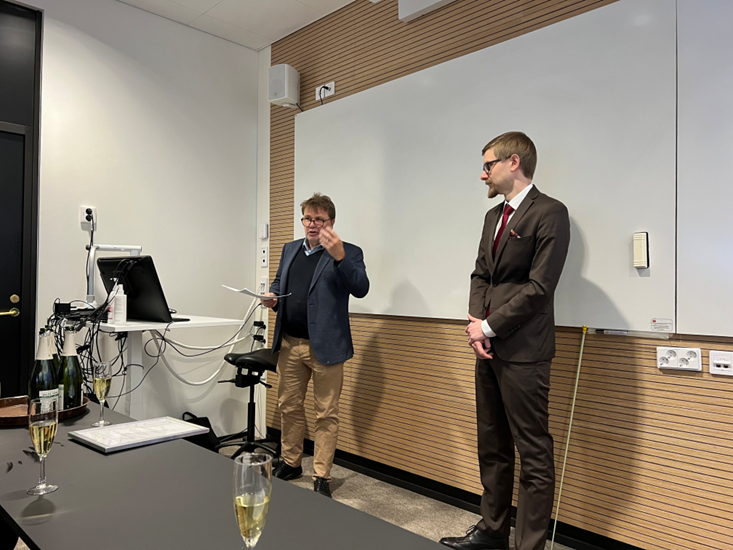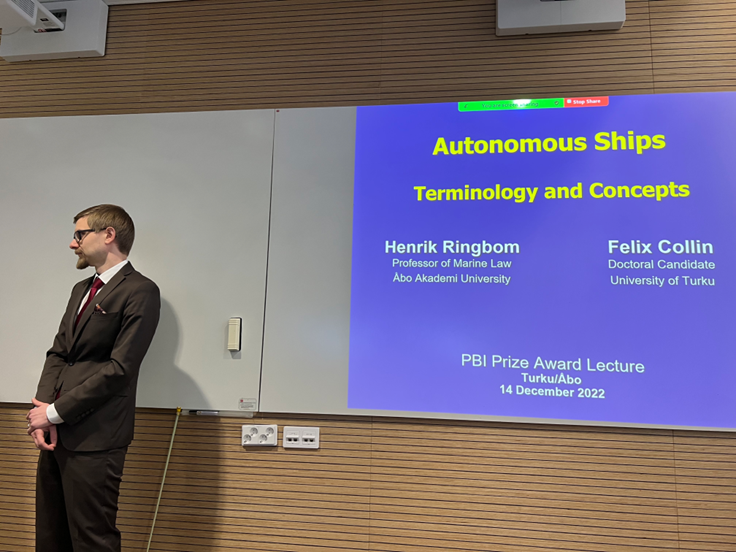Previous winners
The PBI Prize 2022 awarded to Johnny Långstedt, Jonas Spohr, Magnus Hellström, Anastasia Tsvetkova, Erik Niemelä, Joakim Sjöblom, John Eriksson and Kim Wikström
The PBI Prize 2023 has been awarded to the authors of the publication “Customer perceptions of COVID-19 countermeasures on passenger ships during the pandemic”. The article was published in the scientific journal Transportation Research Interdisciplinary Perspectives.

The Covid-19 that hit us during 2020 had a devastating effect on several businesses, especially those linked to travel and leisure, and the cruising industry was hit extremely hard. The cruise industry particularly suffered from negative publicity as the virus spread rapidly on cruise ships. In order to mitigate the effects a number of countermeasures were taken by the operators and a study on the perceived impact of these changes by the cruising customers are the basis for this publication.
This study illustrates, through a mixed-methods research design, what factors cruise and ferry operators considered in their responses to the pandemic, whether the implemented countermeasures increased their customers’ sense of security, and what countermeasures customers would agree to follow before boarding a ship. The study thereby provides insights into which countermeasures are likely to decrease customers’ perceived health risks and which they are ready to accept or not on cruises during pandemics.
The PBI Prize 2022 awarded to Henrik Ringbom and Felix Collin
The PBI Prize has been awarded for a chapter published in the scientific book: ”Autonomous Ships and the Law” (2021). The title of the chapter is “Terminology and concepts”. It addresses the key concepts and issues that are necessary for understanding and regulating autonomous ships and how they relate to each other.
All existing maritime rules are based on the assumption that humans are operating the ship and in charge of all decisions on board. The development of technologies that can operate ships autonomously has therefore brought about a need for new rules in this matter, but how those rules should be designed is still open. The International Maritime Organization (IMO) has started to work on the matter, but there is still no agreement on the key building blocks that should be identified for the purpose.
The article identifies three key elements that form the core of ship automation: the technical capability, the level of manning and the level of autonomy. All three elements may exist ‘more or less’, on a sliding scale, and they are inter-linked in the sense that a change in one of the elements affects the premises for the other two. The three issues raise very different legal issues and operate on different time-scales, which highlight the need for separating them in the future regulatory framework.


– A workable theoretical framework for addressing various aspects of ship automation is a crucial aspect of successful regulation of the matter, Ringbom and Collin emphasize. The regulatory process is only now beginning to take shape at the IMO, so it is hoped that our article can be of assistance for the delegates who are involved in this process, the authors say, hoping that the prize may help to increase the visibility of their research.
2021
The PBI Prize 2021 awarded to Henry Schwartz, Magnus Gustafsson and Jonas Spohr
The PBI Prize, funded by the Foundation for Project Research, has been awarded to a team researching in sustainable seaborne logistics. The prize was awarded for an article published in the scientific journal: Journal of Cleaner Production. The title for the article is:
Emission Abatement in Shipping – Is it Possible to Reduce Carbon Dioxide Emissions Profitably?
The lead author for the article is doctoral student Henry Schwartz.
The point of departure is that the shipping sector generates significant amounts of carbon dioxide emissions. Since carbon dioxide is harmful for both the environment and the society there is willingness and pressure to decrease the volume of anthropogenic carbon dioxide emissions in shipping. In this article, the research team investigates operational and technological measures by which shipping companies can not only reduce carbon dioxide emissions but also obtain an economical payoff for doing so. This is done by modeling emission reduction potentials and cost structures for a sample of cargo ships operating in the sector of short sea shipping. The findings argue that a significant amount of carbon dioxide emissions can be reduced from the shipping sector profitably. This is partly because of improved operational performance and partly because of enhanced energy efficiency.